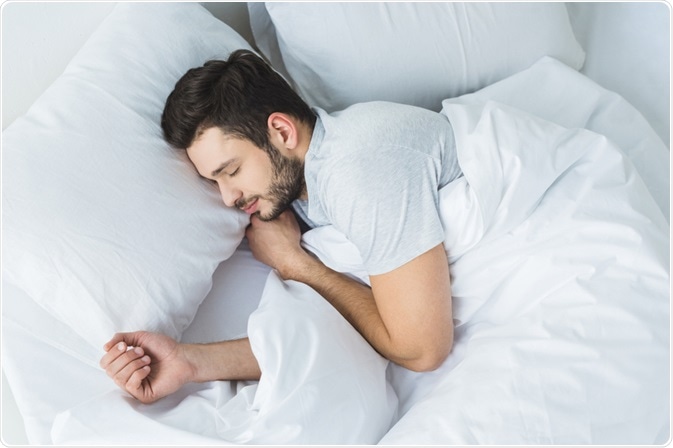Sleep is essential, but we know surprisingly little about it
One in three Americans fails to get enough sleep each night, according to the latest figures from the Centers for Disease Control and Prevention (CDC).

Image Credit: LightField Studios/Shutterstock.com
It is also estimated that around 50 to 70 million people in the US suffer from sleep-related problems.
What is interesting is that these problems seem to impact people regardless of age, gender, and socio-economic status, although certain sleep disorders have been noted to be more prevalent in underserved populations.
These figures are important, given that sleep is essential for our wellbeing. It promotes good health and helps us to function properly.
However, given its vital role, much still remains unknown about the nature of sleep, about the processes that regulate it and how. Uncovering this information is key to developing new effective treatments for sleep disorders.
A genetic link to a good night’s sleep?
Over the past decade, the neuropeptide S receptor (NPSR1) has become a major focus of research into sleep and circadian rhythms.
A mounting body of evidence has shown that it is a gene that is involved in arousal and wakefulness, and also in regulating the sleep/wake cycle.
In particular, studies into the single nucleotide polymorphism (SNP) rs324981 in NPSR1 have elucidated the underlying mechanisms of the NPS-system in its role in sleep regulation.
Back in 2014 a team of researchers in Leipzig, Germany were inspired by this research and set about to deepen our understanding of the functioning of the NPS-system in sleep regulation.
They already knew that increased sensitivity of the NPSR1 gene is caused by the T-allele sue to amino acid exchange.
The German team was able to replicate these findings using an objective measure of sleep for the first time. They determined that sleep patterns in humans were indeed influenced by the NPSR1 gene.
Since then our knowledge of the NPSR1 gene has advanced. A study published last year in the journal Science Translational Medicine describes how a team at the University of California San Francisco (UCSF) who had previously identified two human genes that promote "natural short sleep” had successfully identified a third gene.
The team had found a single-letter mutation in the NPSR1 gene that was related to short sleep (with the father-son participants in the study sleeping an average of 5.5 and 4.3 hours respectively).
While the genetic mutation is incredibly rare, with less than one in four million individuals having it, this insight is vital to furthering our knowledge of NPSR1’s role in sleep. The researchers investigated further into the function of the gene by designing studies with mice.
The team found that the NPSR1 protein is responsible for initiating a state of wakefulness. Activation of this protein triggers activity in other proteins that are encompassed by the same pathway.
In the set of studies conducted on mice, the researchers injected a substance that is known to trigger NPSR1 in a group of control mice and those who had been genetically engineered.
In analyzing the downstream effects of injecting both groups with this compound, the team discovered that more downstream proteins in the cellular pathway were activated by the mutant NPSR1 protein in comparison to the non-mutant version.
Also, the scientists ran another study in parallel where they demonstrated the ease of triggering the mutant version of the NPSR1 gene in comparison to its non-mutant counterpart.
These results highlight the function of the mutant form of the NPSR gene, showing it to be easier to activate and causing more downstream activity than the non-mutant version.
Its role is implicating in regulating feelings of wakefulness, which may be altered in some specific sleep disorders. The recognition of the activity of this gene could represent a step towards developing new therapies for those suffering from sleep disorders.
Sources:
- Short Sleep Duration Among US Adults. Available at: https://www.cdc.gov/sleep/data_statistics.html
- Spada, J., Sander, C., Burkhardt, R., Häntzsch, M., Mergl, R., Scholz, M., Hegerl, U. and Hensch, T. (2014). Genetic Association of Objective Sleep Phenotypes with a Functional Polymorphism in the Neuropeptide S Receptor Gene. PLoS ONE, 9(6), p.e98789. https://www.ncbi.nlm.nih.gov/pubmed/24896296
- Xing, L., Shi, G., Mostovoy, Y., Gentry, N., Fan, Z., McMahon, T., Kwok, P., Jones, C., Ptáček, L. and Fu, Y. (2019). Mutant neuropeptide S receptor reduces sleep duration with preserved memory consolidation. Science Translational Medicine, 11(514), p.eaax2014. https://stm.sciencemag.org/content/11/514/eaax2014
Further Reading